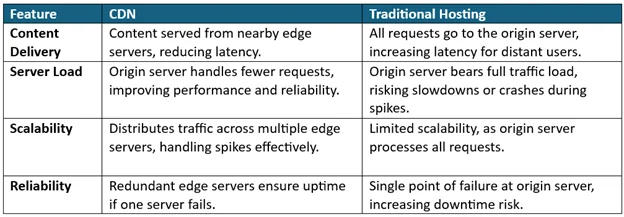|
Voiced by Amazon Polly |
Overview
In today’s digital world, website speed is critical for user satisfaction, search engine rankings, and business success. A Content Delivery Network (CDN) is a powerful tool that accelerates website performance by delivering content more efficiently to users worldwide. But what exactly is a CDN, and how does it make websites faster? This blog explains what a CDN is, its benefits, and why it’s essential for speeding up websites.
Pioneers in Cloud Consulting & Migration Services
- Reduced infrastructural costs
- Accelerated application deployment
CDN
A Content Delivery Network (CDN) is a distributed network of servers strategically located across various geographic regions, designed to deliver web content to users faster. CDNs work by caching copies of a website’s static content, such as images, videos, CSS, JavaScript files, and HTML, on edge servers closer to the end user. By reducing the physical distance between the user and the server, CDNs minimize latency and improve load times. CDNs are widely used by websites, e-commerce platforms, streaming services, and apps to ensure fast, reliable content delivery, regardless of where users are located.
Key Benefits of Using a CDN
CDNs offer numerous advantages that enhance website performance and user experience:
- Faster Load Times
CDNs reduce latency and accelerate page load times by serving content from the closest edge server. For example, a user in Tokyo accessing a website hosted in New York will receive content from a nearby edge server in Asia, rather than waiting for data to travel across the globe.
- Improved Reliability
CDNs distribute content across multiple servers, ensuring redundancy. If one server fails, another can take over, minimizing downtime and ensuring consistent access to the website.
- Enhanced Scalability
During traffic spikes such as during a product launch or viral campaign, CDNs can handle increased demand by distributing the load across their network, preventing origin server overload.
- Better Security
Many CDNs offer built-in security features, such as DDoS protection, Web Application Firewalls (WAF), and SSL/TLS encryption, to safeguard websites from cyberattacks and ensure secure data transmission.
- Reduced Bandwidth Costs
By offloading traffic from the origin server to edge servers, CDNs reduce the amount of data the origin server needs to process, lowering bandwidth costs for website owners.
- Global Reach
CDNs enable websites to deliver consistent performance to users worldwide, regardless of location, making them ideal for businesses with a global audience.
How CDNs Speed Up Websites
CDNs improve website performance through several mechanisms:
- Geographic Proximity: By caching content on edge servers close to users, CDNs minimize latency and reduce the time it takes to load web pages.
- Load Balancing: CDNs distribute traffic across multiple servers, preventing any single server from becoming overwhelmed and ensuring optimal performance during high-traffic periods.
- Content Optimization: CDNs often compress files, optimize images, and minify code (e.g., removing unnecessary characters from CSS and JavaScript) to reduce file sizes and speed up delivery.
- Caching Dynamic and Static Content: While static content is cached on edge servers, advanced CDNs also optimize dynamic content delivery through techniques like Edge Side Includes (ESI) or dynamic content caching.
- Reduced Server Load: By handling a significant portion of traffic, CDNs alleviate pressure on the origin server, allowing it to focus on processing dynamic requests.
CDN vs. Traditional Hosting

Conclusion
Whether running a small blog or a large e-commerce platform, integrating a CDN can significantly enhance your website’s performance and help you stay competitive in the digital landscape.
Drop a query if you have any questions regarding CDN and we will get back to you quickly.
Making IT Networks Enterprise-ready – Cloud Management Services
- Accelerated cloud migration
- End-to-end view of the cloud environment
About CloudThat
CloudThat is an award-winning company and the first in India to offer cloud training and consulting services worldwide. As a Microsoft Solutions Partner, AWS Advanced Tier Training Partner, and Google Cloud Platform Partner, CloudThat has empowered over 850,000 professionals through 600+ cloud certifications winning global recognition for its training excellence including 20 MCT Trainers in Microsoft’s Global Top 100 and an impressive 12 awards in the last 8 years. CloudThat specializes in Cloud Migration, Data Platforms, DevOps, IoT, and cutting-edge technologies like Gen AI & AI/ML. It has delivered over 500 consulting projects for 250+ organizations in 30+ countries as it continues to empower professionals and enterprises to thrive in the digital-first world.
FAQs
1. What types of websites benefit most from using CDN?
ANS: – Websites with a global audience, such as e-commerce platforms, streaming services, news sites, or blogs with heavy media content (images, videos), benefit most from CDNs. They ensure faster load times, better reliability, and scalability during traffic spikes, improving user experience and engagement.
2. Do CDNs only help with static content, or can they improve dynamic content delivery too?
ANS: – While CDNs primarily cache static content like images, CSS, and JavaScript, advanced CDNs also optimize dynamic content using techniques like Edge Side Includes (ESI) or dynamic content caching, reducing latency for personalized or frequently updated content.

WRITTEN BY Aastha Pancholi
Aastha works as a Research Associate at CloudThat and is deeply enthusiastic about exploring cloud computing and innovative software technologies. She is passionate about learning and breaking down complex ideas for beginners. In her free time, she likes trying out new tools and technologies.


 Login
Login


 July 29, 2025
July 29, 2025 PREV
PREV











Comments